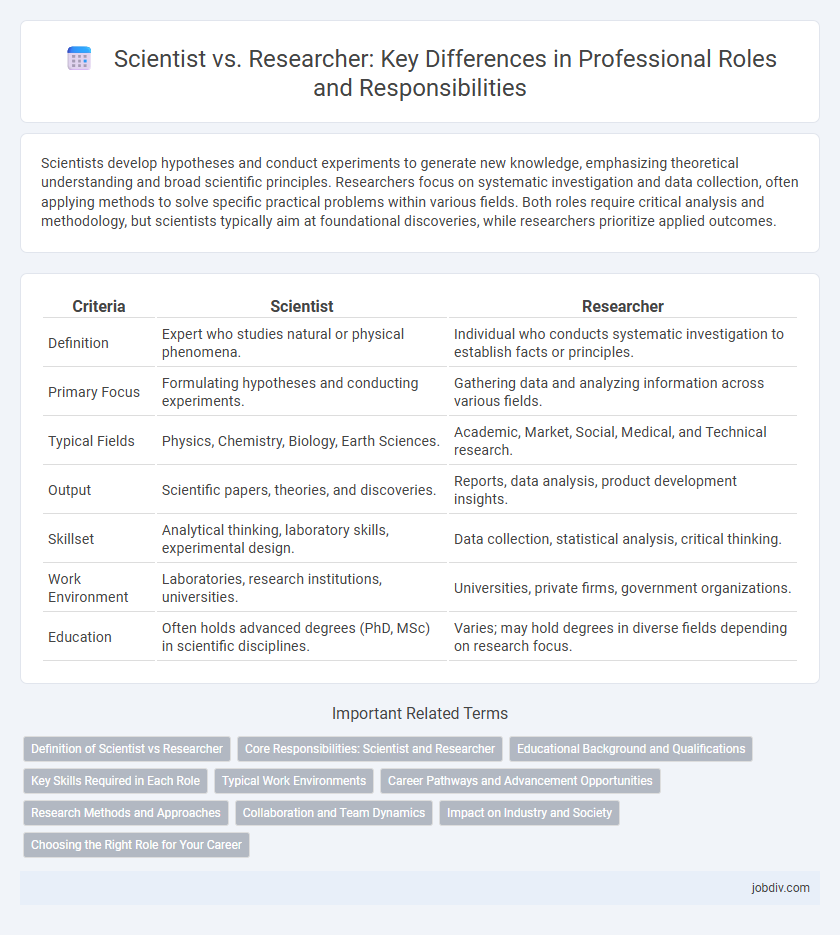Scientists develop hypotheses and conduct experiments to generate new knowledge, emphasizing theoretical understanding and broad scientific principles. Researchers focus on systematic investigation and data collection, often applying methods to solve specific practical problems within various fields. Both roles require critical analysis and methodology, but scientists typically aim at foundational discoveries, while researchers prioritize applied outcomes.
Table of Comparison
| Criteria | Scientist | Researcher |
|---|---|---|
| Definition | Expert who studies natural or physical phenomena. | Individual who conducts systematic investigation to establish facts or principles. |
| Primary Focus | Formulating hypotheses and conducting experiments. | Gathering data and analyzing information across various fields. |
| Typical Fields | Physics, Chemistry, Biology, Earth Sciences. | Academic, Market, Social, Medical, and Technical research. |
| Output | Scientific papers, theories, and discoveries. | Reports, data analysis, product development insights. |
| Skillset | Analytical thinking, laboratory skills, experimental design. | Data collection, statistical analysis, critical thinking. |
| Work Environment | Laboratories, research institutions, universities. | Universities, private firms, government organizations. |
| Education | Often holds advanced degrees (PhD, MSc) in scientific disciplines. | Varies; may hold degrees in diverse fields depending on research focus. |
Definition of Scientist vs Researcher
A scientist is an individual who systematically studies the natural world through observation and experimentation to develop theories and laws. A researcher, on the other hand, is someone who conducts focused investigations and analyzes data across various disciplines to generate new knowledge or solve specific problems. While all scientists engage in research, not all researchers fit the specialized criteria of scientists, as research can occur in non-scientific fields such as social sciences, humanities, or market analysis.
Core Responsibilities: Scientist and Researcher
Scientists primarily focus on formulating hypotheses, conducting experiments, and analyzing data to advance theoretical knowledge across various disciplines. Researchers design and implement systematic investigations, often applying scientific methods to solve practical problems and generate actionable insights. Both roles require meticulous data collection and critical evaluation, but scientists emphasize discovery and theory development while researchers prioritize application and experimentation.
Educational Background and Qualifications
Scientists typically hold advanced degrees such as a Ph.D. in specialized fields like biology, chemistry, or physics, reflecting extensive formal education and training. Researchers often possess diverse educational backgrounds, ranging from bachelor's degrees to doctorates, depending on their area of study and the nature of their research projects. Both roles require strong analytical skills, but scientists usually engage in hypothesis-driven studies while researchers focus on systematically investigating questions across applied and theoretical domains.
Key Skills Required in Each Role
Scientists require strong analytical skills, expertise in hypothesis formulation, and proficiency in laboratory techniques to conduct controlled experiments. Researchers need excellent data collection abilities, critical thinking to evaluate findings, and effective communication skills for presenting results across diverse platforms. Both roles demand a solid foundation in domain-specific knowledge and rigorous attention to detail for achieving accurate and reliable outcomes.
Typical Work Environments
Scientists typically conduct experiments in controlled laboratory settings, universities, or specialized research institutions, focusing on theoretical and applied scientific studies. Researchers often work in diverse environments, including corporate offices, field sites, and academic institutions, emphasizing data collection, analysis, and applied problem-solving. Both roles may overlap but differ significantly in their typical workplaces and the nature of their investigative approaches.
Career Pathways and Advancement Opportunities
Scientists often pursue specialized academic degrees such as a PhD, focusing on experimental research and theoretical development within specific fields like biology or physics. Researchers may follow diverse career pathways, including roles in industry, government, or academia, emphasizing applied investigation and data analysis across multidisciplinary projects. Advancement opportunities for scientists typically involve tenure-track positions and leading independent research labs, while researchers can progress through project management roles and cross-sector collaborations.
Research Methods and Approaches
Scientists employ systematic research methods grounded in empirical data collection, hypothesis testing, and experimental design to validate theories within specific disciplines. Researchers utilize diverse approaches ranging from qualitative analysis to quantitative measurement, often adapting methodologies based on the study's objectives and contextual variables. Both roles prioritize rigorous data evaluation and reproducibility to advance knowledge and innovation in their respective fields.
Collaboration and Team Dynamics
Scientists and researchers often collaborate within multidisciplinary teams, leveraging diverse expertise to drive innovation and solve complex problems. Effective communication and mutual respect enhance team dynamics, fostering an environment where shared goals align with individual contributions. This synergy accelerates discovery, ensuring that experimental design, data analysis, and theoretical insights are integrated seamlessly.
Impact on Industry and Society
Scientists drive innovation by generating new knowledge and theories that challenge existing paradigms, directly influencing technological advancements and industrial processes. Researchers apply these scientific insights to practical problems, developing products and solutions that enhance economic growth and societal well-being. The collaboration between scientists and researchers accelerates the translation of discoveries into impactful technologies, shaping industries and improving quality of life.
Choosing the Right Role for Your Career
Choosing between a scientist and a researcher role depends on your career goals and interests in specialized knowledge or broad investigative skills. Scientists typically focus on specific disciplines, conducting experiments to develop theories and advance scientific understanding. Researchers often work across various fields, applying analytical methods to gather data and solve complex problems, making flexibility and interdisciplinary collaboration crucial in their roles.
Scientist vs Researcher Infographic

 jobdiv.com
jobdiv.com